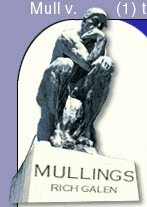|
|

|

Click here to keep up with Galen's Speaking Schedule
Looking for a back issue of Mullings? They're in the
Archives
Greed
 Wednesday, May 1, 2002
Wednesday, May 1, 2002
Click here for an Easy Print Version
From Anchorage, Alaska
- Bernard J. Ebbers got fired over the weekend. He was the founder and chief executive of WorldCom which he formed when he combined a small long distance re-seller with long-distance giant MCI.
- He was a dandy story. According to a Wall Street Journal article by Rebecca Blumenstein and Jared Sandberg, "Mr. Ebbers, a former motel-chain manager, started the company, then known as LDDS (for long-distance discount service) at a Mississippi coffee shop in 1983."
- Bernie Ebbers was known for charting a course for WorldCom as of the most aggressive acquirers of companies on the American business landscape. He did about 60 major deals. What had not been too widely known was that Mr. Ebbers was just as aggressive in acquiring companies for his own portfolio.
- He bought a shipbuilding business in Savannah, Georgia; a 164,000 acre tract of timber in Canada, and a soybean farm in Louisiana, among others.
- This would not be a problem - or even newsworthy - if it were not for the fact that Mr. Ebbers bought these companies by borrowing money from large banks and pledging his WorldCom stock as collateral.
- Neither would this be a problem - or even newsworthy - if it were not for the fact that the price of WorldCom shares has dropped from almost $65 per share in June of 1999 to about $2 - that's T-W-O Dollars - per share this week.
- That's the problem part. The newsworthy part is this: WorldCom lent Mr. Ebbers somewhere in the vicinity of $343 Million - more than a third of a BILLION - to repay the banks. And Mr. Ebbers borrowed his money at an average interest rate of less than 2.5 percent.
- The company maintains that the loans were actually a favor to the other shareholders. If Ebbers had been forced to dump shares to pay the banks, the stock price would have been driven down and thereby would have cost shareholders a good deal of their value. Which is what happened anyway.
- This ignores the point that if Ebbers had not pledged stock as collateral in the first place, then the other tens of thousands of shareholders' share value would never have been at risk.
- There is a fine line which separates entrepreneurial vigor from simple greed. It is a line, alas, which seems to be invisible to a person about to cross it.
- Another story. A week or so ago one of the big, national lotteries built its payoff to some $331 million. Ironically, if Bernie Ebbers had won he could have come out of this whole thing clean. But that's not the story.
- The story is this: 20 people, toiling on the night shift in a New Jersey nursing home, pooled some money, and sent a nurse's aide out to a local liquor store to purchase $100 worth of lottery tickets.
- Comes the drawing and the word goes out that one of the three winning tickets was, indeed, purchased in New Jersey.
- The nurse's aide starts calling in sick and the other members of the night shift who were in the pool decide he must have purchased the winning ticket and is keeping it from them.
- Fraud! Swindle! Treachery! Perfidy! Ok. Not perfidy. No one in New Jersey has used the word perfidy since Burr challenged Hamilton.
- Lawyers are called in. Newspaper reporters show up. TV news crews camp out. Book deals, movies and miniseries are in the air. This is a $110 million story and it's a dandy, too. The night crew members want their share so they can buy ship yards, timber tracts, soybean factories, and who knows what-all.
- Except they were wrong. The nurse's aide had not purchased the winning ticket. Some other guy did. Without one bit of evidence to support their theory, the night shift crew turned on their colleague.
- The hundred bucks worth of tickets were not a total loss. They won a total of $2.
- Just about enough to buy one share of WorldCom.
- Greed.
- On the Secret Decoder Ring page today: the Seven Deadly Sins, the definition of "perfidy," well as the usual stuff.
--END --
Copyright © 2002 Richard A. Galen
If you are working at a lobbying firm, a government affairs office, a coalition, or a PAC you should take a
look at this page to see how advertising in Mullings might serve your organization very well:
Current Issue |
Secret Decoder
Ring | Past
Issues | Email
Rich | Rich
Who?
Copyright �1999 Richard
A. Galen | Site design by Campaign
Solutions. | |
|
